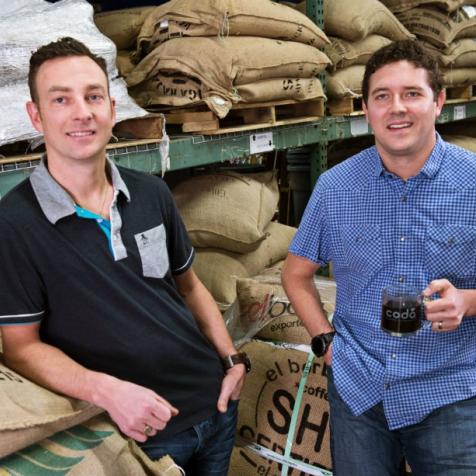
Company Details
Location
Denver, Colorado
Founded
2005
Ownership Type
Private
Employees
35
Products
Coffee, CBD Drops, Retail Display
Denver
Founded: 2005
Privately owned
Employees: 35
Industry: Food & Beverage
Products: Coffee
Co-founders and brothers Tim and Tommy Thwaites are redefining not just sustainable coffee, but sustainable enterprise, too.
Tim and Tommy Thwaites came of age in the suburbs of Seattle in the 1990s, "when people were still figuring out the latte," Tim says.
When Tommy accepted a position at an emerging hometown coffee shop, he snagged his little brother a job sweeping the floors. For Tommy, "Coffee was a means to get through college. By the time I graduated, I'd fallen in love with the industry." He'd also landed a job as vice president, and Tim was appointed roastmaster.

Tim soon tried exiting the coffee industry; he got a degree in aviation, and was all set to be a commercial pilot. "But then 9/11 happened, and I bailed," he says.
The brothers came to Colorado, dabbled in coffee, and were selling life insurance door-to-door when Tim approached his brother with the idea of launching their own coffee company. "We started Coda in July of 2005, and that was a mess," Tim recalls.
"We had no real business acumen," Tommy adds. "We were just coffee guys."
The brothers found their stride, and by 2006 they'd identified an overarching mission centered on sustainability, both social and environmental.
In commercial coffee, Tim explains, hundreds of farmers in a community pool their beans together, and not all of those beans are the same, quality-wise. Partnering with importers -- Atlas Coffee Importers, among others -- Tim, Tommy, and fellow buyers work with farmers on a grassroots level, participating in international cupping competitions, from Guatemala to Somalia.

"We'll go down and try each farmer's coffee," Tim says, offering, "When somebody's doing an amazing job, we'll try to figure out why their product is better. When we share that information with others farmers, the overall quality goes up for their communal coffee."
High-performing farmers are rewarded, too: Special lots of coffee are auctioned off higher than the community rate, farmers typically sell these unique micro-lots for double or triple the going rate.
Coda's philanthropic mission also extends to broader community development. The company has donated money for a cupping lab in Uganda, and it raised cash for a library in El Salvador.
When green coffee lands at Coda's 18,000-square-foot Denver roastery, at the B Corp's headquarters, sustainability continues in the warehouse.
"We have the world's first eco-friendly roaster," Tim explains. Their Brazilian Lilla roaster was the first of its kind to be shipped to the U.S., and is over 50 percent more efficient than the competition, recycling heat off of its afterburner to roast more coffee. "We buy better coffee, and can sell it to the consumer at a cheaper price because we're using less gas," Tim summarizes.
On-site recycling and composting programs also help eliminate up to 75 percent of waste, Tim says. Burlap sacks containing raw beans are donated to local nurseries, gardening centers, and Mission Wear.
"Green coffee comes in, and we throw it into our 60-kilo roaster," says Tim. Roasting takes 15 to 18 minutes, depending on where the processed beans will fall on the light-to-dark spectrum. Tim roasts plenty of dark blends -- "A lot of people are looking for that," he says -- but he roasts his best beans "super-light," to accentuate the taste.
"Coffee is like really good steak," says Tim. "If you know the chef has taken time to pick a quality beef, you probably want to order it rare."

Coda produces about twenty single-origin coffees, and up to 50 blends, Tommy explains. And the company moves upwards of 16,000 pounds of coffee weekly, selling the majority of its output to restaurants and cafes, including Etai's, Jax Fish House, Lola, Linger, and Root Down.
"We're big on training," says Tim, noting that Coda factories house training labs where chefs and restaurateurs can learn to make really, really good coffee.
Coda sells direct to consumers, too, in Whole Foods Market and Natural Grocers; the company has a year-old brick-and-mortar in Edgewater, and kiosks at the University of Colorado Denver and the University of Phoenix Stadium, home of the NFL's Arizona Cardinals. The company also started roasting at its 10,000-square-foot Glendale, Arizona facility in late 2016.
Both sites are equipped for nitro cold brew coffee. "It's the thing right now," Tommy says, adding, "We've been in research and development on cold brew for about 18 months, and have been selling it for nine months."
Cold brew requires unique equipment, plus a walk-in cooler that holds 150 kegs, the latter of which enabled Coda to be one of the first suppliers to distribute cold brew to retail stores. "How we fill the kegs gives our cold brew a longer shelf life without the preservatives," Tommy says.
Challenges: The biggest, Tommy says, are allocating money and seeking the right opportunities. "We want to take advantage of everything," Tim adds. "But," he says, "We have to evaluate opportunities and say no sometimes."
Opportunities: Coda is held by its partner company, Crux Investments, which is owned by both brothers. "What we evolved into is differentiation within the service industry," explains Tommy. He and Tim plan to grow their overarching brand, and find new niches within coffee.
Needs: "In coffee, you always need more equipment, and more money to pay for that equipment," Tim says.

